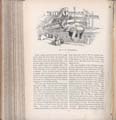
stnic.190402.001.001.jpg
WHEN young Orang heard the steady tramp of feet about his forest home one morning, he little thought there was cause for alarm. His home was in one of the thick forests that cover the low, damp lands in the island of Borneo—forest depths human feet seldom tread. His father was an immense orang-utan known as "The Wild Man of the Woods" by the natives of Borneo. As he measured nearly seven feet in height, and was heavier than many human giants, he made so much noise, in walking about on the thick underbrush with Orang's mother, that there was nothing unusual in the ominous tramping on that fateful morning.
The steps came nearer, the underbrush crackling more noisily. Orang raised his strangely manlike yet baby face to greet his parents, But, instead of receiving his usual breakfast of forest fruits and nuts, he was nearly smothered under a heavy blanket which was thrown over his head and drawn securely about his throat A few piteous cries for help,—quelled before they could reach even his mother's keen ears—a whoop of delight from his captor, and poor little Orang was hurried away from his forest home. Then came a weary journey, which seemed interminable to the homesick, frightened baby orang-utan, until at last he reached Germany and was placed in a great animal-house at Hamburg, to await the arrival of the ship which was to take him across the ocean to an American zoo.
Like other members of the intelligent family of apes, ()rang soon became fond of
his captors, and especially fond of the small black boy who claimed him as his
own particular pet. The little negro boy who first discovered Orang and threw
the blanket over his head, before yelling with joy to tell the other hunters of
his capture, resembled very much the natives of the African jungles; hut any one
who talked with Jeff soon discovered that he was not born in Africa. He had had
many adventures in his short life, and was a remarkably intelligent black boy.
He was born in Chicago, in the year that Grover Cleveland was first elected
President of the United States. He was left an orphan when only five years old,
and was given a home by an Irishman in the employ of a Chicago animal-trainer.
His full name was Jefferson Davis Cleve¬land McKinley O'Toole. For many years it
was a trial to Jeff to have this glorious procession ab¬breviated. Although his
mother named him, modestly, Jefferson Davis Cleveland, O'Toole
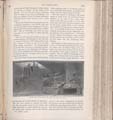
stnic.190402.001.002.jpgwas the name of the Chicagoan of whose family he
became a member on the death of his parents. No one was ever able to determine
how he came by the name of McKinley; but for years Jefferson Davis Cleveland
McKinley O'Toole insisted upon the use of his "whole name."
When Carl Hagenbeck, the proprietor of the zoological exhibition at the World's Fair, sent buyers to London and to Hamburg for his specimens, Mr. O'Toole and his little helper,"Black Jeff," went to Hamburg with them, and they were sent on an expedition to Africa for wild animals.
After the first trip, Jeff became an expert in animal-hunting; and although he still looks like a comical overgrown child, being small for his age,—almost a dwarf, in fact,—he has had many strange adventures. He proudly claims the distinction of having accompanied expeditions sent out by Wan Ambrugh, Carl Hagen-beck, Frank Buckland, Mr. Bartlett, and other zoological collectors and great circus and menagerie proprietors.
Jeff and Orang became great friends during[illustration - Below decks on an animal-ship bound home from the tropics.] the trip from the island of Borneo to Hamburg. The ape soon learned to consider the black boy his companion instead of his captor, and often Jeff would be found sitting on a box on the upper deck, scraping away at his beloved violin, sometimes with an occasional parrot or two or a friendly little monkey as audience, but always with the faithful Orang at his side.
After their arrival at Hamburg, Jeff taught Orang so many tricks and exercised such an influence in the care of the vicious chimpanzees and baboons, as well as of the more docile apes and South American monkeys, that he was given certain duties in the monkey-house instead of being sent on another expedition. It was finally decided that he should accompany the monkeys on the animal-ship during their trip to the United States. Jeff named his pet "Orang," and, jokingly, always insisted that the captive was a real boy, and he spelled his pet's name with the apostrophe, thus: O'Rang.
The majority of the freight-ships that come to ports of the United States from
South America, Africa, Asia, or Europe bring a few wild beasts that have been
secured in the interior and brought to the ports at which the vessels touched.
But it is mainly at Hamburg, in Germany, that attempts have been made, during
recent years, to secure regular shipments. One reason is that, when consignments
are desired for American zoos, the animals can be collected at Hamburg and
shipped free of duty. At the ime of the World's Fair in Chicago, Carl Hagenbeck
made some of the largest purchases of
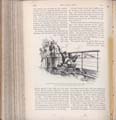
stnic.190402.001.003.jpgwild animals
ever recorded for this country. London as well as Hamburg helped to supply the
great stock of animals necessary for his Chicago exhibits at the Fair grounds
and in New York. At that time there was a great revival in the ancient industry
known as the "animal trade," but during the past eight or ten years the business
has somewhat decreased. Hamburg is still the chief shipping center, but the
animal-ships are seldom so well loaded with interesting wild beasts as they were
during 1893.
Everything connected with the ship that left Hamburg with Jeff and his pet, Orang, seemed very wonderful to the black boy, who had a long[illustration - "And often Jeff would be found on the upper deck scraping away at his violin, but always with the faithful orang at his side."] hunted animals in the wilds, but had never crossed the ocean with a ship-load. The immense animal-house at the Hamburg wharf has two departments, known as the "store" and the "stables." The stables, where the wild beasts are confined while awaiting the arrival of the ship, are situated at some distance from the store, and the two are connected by a street or court. Down this passage every animal must be driven, or carried in its cage, before it can be deposited in safe quarters in the store or on the ship.
Jeff and Orang became quite familiar with the animals in the wonderful stables at Hamburg. Jeff's knowledge of the wild beasts, and of the best methods of keeping them quiet and good-natured, made him invaluable to the dealers, and, wherever he was found, his orangutan was near by.
When the ship arrived at the Hamburg wharf there were anxious moments at the stables. The passage leading from the stables is narrow, for convenience in blocking the escape of any captive that succeeds in breaking away from the dealers. But, frequently, the straitness of the passageway makes it very difficult to take the huge iron cage of a refractory elephant or other large beast down to the ship.
The animals from the ground floor of the stables were the first to board the vessel. Very Few of them were in cages; they were simply tied to the walls and mangers, or they were stalled in loose-boxes. Among them were antelopes, deer, kangaroos, and a few curious mountain-sheep. All these animals were loaded upon the ship without difficulty. The majority of them had quarters on shipboard similar to those in the stables—simply stalls instead of cages.
There was often great difficulty in the transit of the large iron cages. The hold
of the ship, where these wild animals are stored, is kept warm
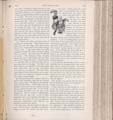
stnic.190402.001.004.jpgand dark—conditions which prevailed in the warm
upper story of the stables, and constituted important elements in the comfort of
nervous animals, the night-feeders, and the savageFelida
or cat-tribe. The civet-cats, the pumas, and the panthers are especially fierce
when taken from the stables to the ship. Their cages are kept boarded over at
the sides and back. At the first movement of the cage, or at the approach of a
dealer to examine the front of the cage, the animal inside becomes furious.
There are claws crashing upon the bars, sharp, wrathful growls, and glimpses of
white teeth and yellow-green eyes. This proved very interesting to Jeff, who had
studied the prisoners when they were free in their jungle homes.
It is seldom that serious accidents occur in loading the animal-ship. There were two mishaps, however, that might have been serious but for the prompt action of the little Chicago colored boy. A tiger from India was being trundled through the narrow passage leading from the stables. The huge cage was difficult to handle. The bumping of the structure against the sides of the passage not only weakened it, but enraged the tiger. Using his back in a powerful arch, he burst the cage, and ran growling down the passage. The tiger—one of the fiercest ever captured—had been caged only a short time. He was now as strong as ever, and twice as ferocious. The crew of the animal-ship, as well as the dealers, were so paralyzed with terror that, for a moment, no effort was made to stop his flight.
But Jeff remembered the prompt action of a hunter while capturing a tiger that had escaped from a cage in India. He grasped a crowbar and started for the animal. At first sight of the determined black boy with his crowbar, the tiger seemed inclined to attack him. It was a terrible moment, and death was very near to the daring boy. But he advanced unflinchingly, until at last the tiger, with a snarl of rage, turned, ran back up the passage, and again entered his cage, curling down in its darkened corner, but continuing to snarl, while he was speedily secured by the dealers.
For three days and four nights the ship that was to sail for America remained at Hamburg, taking on board the animals and their necessary food. During nearly the whole time, a savage baboon was at large. He escaped from his cage on the night of the ship's arrival. The baboons were among the first to be taken on board. One of the most hideous of them broke loose, opened the window of the room in which it was confined, and leaped to the roof of an opposite house. It hid be hind the chimneys, enjoying their warmth and chattered defiance at its pursuers. A row of dwelling-houses stood directly back of the stables, and the entire street was soon in commotion. The children of Hamburg were afraid to go to bed. The crafty fellow escaped capture during the entire three days. It was thought the ship would have to sail without him, for while he found it easy to walk on the narrow ledges and steep inclines of the roofs, the men could not follow him, and it was always easy to hide among the chimneys from his pursuers.
It was Jeff who captured him, at last, by climbing along the roofs barefoot, with a rope secured from waist to chimney for safety. Even then there would have been difficulty in attracting the attention of the baboon until the lasso could be used, had it not been for the presence of Orang, who was also secured to his waist by a rope, and was sent along the edge of the roof after the fugitive.
The animals soon quieted after the ship had left the Hamburg wharves and departed on its journey across the ocean.
It was marvelous to Jeff, learned as he was in the lore of the cages, to observe
how the dealers who had invested their money in so many beasts that were liable
to quick disease and almost sudden death could rest content to see their charges
so closely confined. There appeared to be scarcely room for any animal to turn.
But he came to understand that close packing of the cages, on a voyage such as
that, was imperative. The immense quantities of food that were needed to last
throughout the voyage took up much space. One class of cap-
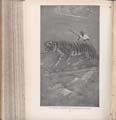
stnic.190402.001.005.jpg
[illustration - "He grasped the crowbar and started for the animal."]
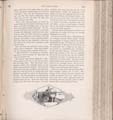
stnic.190402.001.006.jpgtives could not survive unless there was
plenty of hay and grain; another must have fruits and vegetables; and as for the
carnivorous beasts, not only did they require refrigerators filled with meat,
but the very deck was alive with calves, sheep, and poultry.
There were noisy passengers on board the animal-ship, and the noisiest of all were not the tigers, with their terrifying roars, or the monkeys, with their incessant chattering. The disturbers of the peace were the birds—thousands of them that seemingly could never keep quiet. Canaries from the Hartz Mountains, magpies and parrots, birds from the tropics, with rich plumage and strident voices, screamed, talked, and sang until the very elephants—who were the wisest of the whole ship's company—could scarcely sleep.
One bird, that was only half a bird at best, almost caused a stampede. There was a startled cry, one morning, from a member of the crew.
"Man overboard!" he shouted, as a resounding splash echoed through the ship from the water at her side.
The keepers forgot their charges for a time. They rushed to the side of the boat to rescue the drowning sailor. They discovered only a penguin, diving and swimming about in the water with the greatest delight. The bird had escaped from its cage, waddled to the side of the ship, and, with the sound of a falling man, had plunged overboard in search of fish, his natural prey. The bird-fisherman was captured and returned to his cage before he had secured his breakfast from the sea. Some days later, a seal escaped and dived into the ocean. It would probably have been lost had not one of the animal-dealers recalled the experience of the famous Dr. Rae, who spent the days of his boyhood in the Orkney and Shetland Islands. Dr. Rae says that, both there and in the regions around the frozen rim of the northern ocean, it is a matter of common experience that seals will follow a boat in which music is played. One of the musical sailors made the test, and the seal was easily captured.
Various musical instruments are found on an animal-ship, for nearly all beasts are strongly influenced by melody.
On the arrival of the ship at Philadelphia, the two strangely assorted friends parted. Orang, his apostrophe no longer retained by the admiring Jeff, became the inmate of a zoo, where they cherished all the rest of him because, as an orang-utan with a label on his cage, he was prized as a wonderfully rare "specimen" all the way from Borneo. O'Toole, even his sharp wits unequal to the task of compelling the rest of the world to give him the complete assortment of names he claimed for his own, continued to be plain "Jeff." But the world of animal-tamers knew little black Jeff for a born keeper of the untamed beasts; and so, in various parts of the earth, he earned, at his chosen calling, a good living and much respect.
Every year there come some ships from Hamburg, bringing captives, few or many. But, among all the voyages, the most curious and exciting adventures that ever befell man or beast were those which happened when Jeff and Orang, devoted comrades, sailed for Hamburg on their way from distant Borneo.